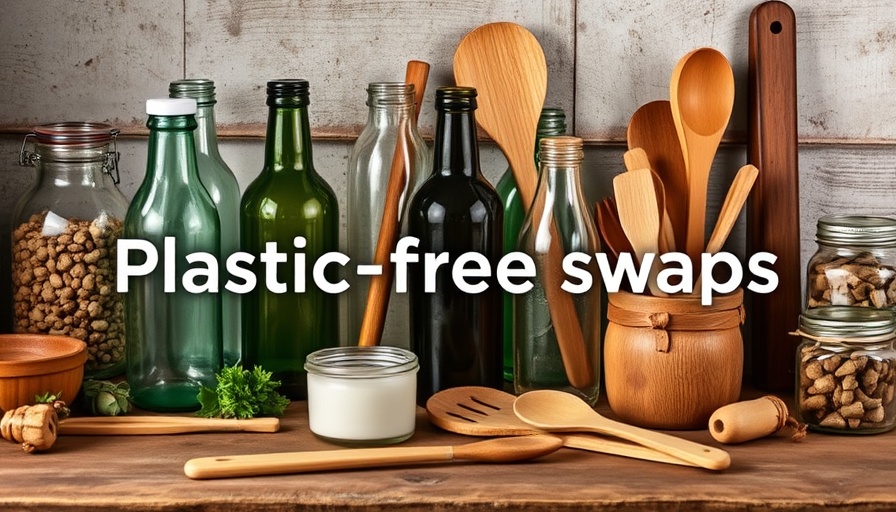
Understanding the Urgency of Plastic-Free Living
Plastic pollution is an everyday reality that affects not just our environment but also our health. The rise in awareness regarding synthetic chemicals like BPA and its harmful alternatives has sparked a movement toward more sustainable living choices. Current research indicates that microplastics, often found in our beverages and food, can have detrimental health effects. Thus, making conscious swaps for plastic-free alternatives becomes essential for both health and ecological well-being.
10 Impactful Plastic-Free Swaps
Transitioning to a plastic-free lifestyle doesn't need to feel daunting. Here are ten impactful swaps, arranged from easiest to more challenging, that will help you significantly cut down your plastic consumption:
1. Bring Your Own Bags, Bottles, and Mugs - This is the easiest swap. Reusable bags, bottles, and mugs can fit seamlessly into daily life, reducing single-use plastics drastically.
2. Ditch the Tea Bags - Opt for loose-leaf tea over tea bags made with plastics, which leach microplastics into your drink.
3. Swap Out Plastic Wrap - Instead of plastic wrap, consider using beeswax wraps or silicone lids that can be reused multiple times.
4. Choose Bar Soap Over Liquid Soap in Plastic Bottles - Switching to bar soap eliminates the need for plastic containers altogether.
5. Try Reusable Produce Bags - Replace plastic produce bags with washable cloth or mesh alternatives.
6. Replace Plastic Toothbrushes - Bamboo toothbrushes are a sustainable alternative that are biodegradable.
7. Opt for Glass Storage Containers - Glass containers eliminate the risk of leaching chemicals and are reusable.
8. Use Cotton Rounds Instead of Disposable Ones - Swap out single-use cotton rounds for reusable cloth ones that can be washed and used again.
9. Choose Workable Alternatives to Fast Fashion - Encourage sustainable clothing brands that use organic materials and recycled fibers.
10. Transition to a Plastic-Free Bathroom - Look for products packaged in glass or cardboard and support brands committed to eco-friendly packaging.
What to Do With Your Old Plastic?
Instead of discarding all plastic items at once, consider practical ways to repurpose or recycle them:
Reuse old plastic bags as garbage liners or for storage.
Donate unused plastic bottles to local schools or communities for art projects.
Keep one plastic bottle specifically for garden watering to prolong its life before disposal.
How Sustainability Benefits the Hospitality Industry
For those in the hospitality sector, implementing plastic-free alternatives not only enhances brand image but can also lead to operational efficiency. Sustainable food service practices, such as utilizing compostable packaging and energy-efficient cold storage, can reduce resource consumption significantly. This is more than a trend; it’s a proactive shift towards net-zero hotels, attracting eco-conscious travelers.
Future Predictions and Opportunities
As we look ahead, the demand for sustainable practices will escalate, pressuring companies to innovate and adapt. This could lead to opportunities for partnerships that focus on reclaimed materials, forest restoration, and broader sustainability strategies that align with consumer preferences for eco-friendly options. Such shifts not only benefit businesses' bottom lines but help mitigate the environmental crisis, so travelers increasingly support eco-tourism.
The Emotional Resonance of Sustainable Choices
For many, converting to a more sustainable lifestyle transcends mere health benefits. It's an emotional journey rooted in care for the planet, the generations to come, and a search for meaning in consumer habits. It fosters a sense of community among supporters of sustainability and inspires individuals to take tangible steps that wield real-world impact.
Conclusion and Call to Action
Taking action towards a plastic-free lifestyle involves making informed decisions that reflect a desire for both personal health and planetary preservation. Consider implementing these plastic-free swaps in your daily routine and spread the word about their importance. Every small step contributes to a larger movement against plastic pollution. The time for sustainable living is now—let’s embrace it together!
 Add Row
Add Row  Add
Add 




Write A Comment